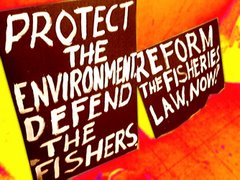
NEW OIL SURVEY OPPOSED 3/13
Fisherfolk fear effect of seismic survey in Cebu, Leyte, Bohol waters
By Ma. Bernadette A. Parco, Senior Editorial Assistant
Her family relies on three kilos of fish that her husband would catch on a good day.
If they don’t have food on the table, they sell the day's catch for P120 per kilo to buy what they need, said Elisa Bransuela, 43, of Borbon town, northern Cebu.
“Pamugas ra ning amo (We use the money to buy rice),” she said.
Her husband, Gomersindo, traveled 83 kilometers to Cebu City yesterday to join other leaders of Borbon fisherfolk groups to oppose a seismic survey that will be conducted this month by NorAsian Energy Limited.
At a press conference, Gomersindo said he fears the survey would distrub the sea and affect his only source of livelihood.
When NorAsian did a similar sea survey in the west coast of Cebu in 2008, fisherfolk groups also complained that their fish catch dropped and fish pens were destroyed.
The Department of Energy (DOE) assured yesterday that the survey, which uses sound waves to check for possible oil and gas reserves under the sea, will not harm the fish, whales or dolphins.
A Chinese vessel, the BGP Challenger, will cover a total of 100 line kilometers in Borbon waters or at a distance of at least 2 kilometers from the town’s shoreline.
The survey period in Borbon will “take only a total of about 15 hours” over two to three days.
But the total coverage of the seismic survey is two offshore sites in waters off Cebu, Leyte and Bohol starting the first week of March.
The survey, which will take two weeks in all, was approved by the Department of Energy under Petroleum Service Contract No. 69 awarded in 2008.
Gomersindo, who heads the Magay Fishermen's Association, signed a letter addressed to the local executives of Bohol, Tacloban City in Leyte, Maasin City in Southern Leyte and Cebu, asking them to oppose the proposed seismic survey and exploration activities at the Camotes and Bohol Seas.
He was joined by other leaders of fishermen's association and environmental lawyers in Cebu City.
“As citizens and stakeholders of the Philippines and the provinces, cities and municipalities of Cebu, Bohol, Leyte and Southern Leyte, we are outraged at the gross, willful and continuing defiance and violation of our Constitution, various laws, Supreme Court rulings on the environment and governance, international conventions and the people's rights to life health and a healthy environment,” the group said in the letter dated March 4, 2010.
This would be the second attempt by NorAsian Energy Limited, an Australian offshore mining company, to conduct a sea exploration for possible gas and oil deposits.
The present plan involves a wider range.
In 2008, NorAsian planned to explore natural reserves at least seven km off the coastlines of Langtad, Argao in western Cebu.
Argao fisherfolk opposed the activity and reported a decrease in fish yield due to the oil exploration activities of NorAsian Energy Ltd. at the Cebu-Bohol Strait.
For the current activity in the Camotes sea, the scope of the survey reaches about 900-line kilometers.
This raised fears that it would have adverse effects on the Danajon Bank, which is a rare double barrier reef off northern Bohol.The reef is one of only three such sites in the Indo-Pacific area.
The protest petition was signed by environmental lawyer Gloria Estenzo-Ramos, who cited the Fisheries Code of the Philippines that “implements this constitutional mandate by ensuring that the municipal waters are for the preferential use of subsistence fisherfolk, excluding commercial fishing vessels therefrom.”
The group also noted that the same law states that “No person, natural or judicial, shall undertake any development project without first securing an Environmental Compliance Certificate from the Secretary of the DENR (Department of Environment and Natural Resources).”
The project violates the preferential right of small fisherfolk as the marine resources in intertidal areas or shallow waters are affected.
“Do we sacrifice the marine ecosystem for a small amount of oil?” asked lawyer Benjamin Cabrido.
A DOE bulletin about the project said no ECC is needed for the sea survey at this stage. The environment department will require one only when there is commercial production of offshore oil and gas.
Antonio Labios, DOE regional director for the Visayas, said he met with members of the Fisheries Improved for Sustainable Harvest (FISH project), which is one of non-government agencies involved with towns within the Danajon Reef.
“They (FISH project) requested for an orientation from our team. We spent four hours explaining, the group was composed of experts, marine biologists,” Labios said.
“Sa among understanding nakasabot sila (We believe they understood the exploration activity),” he added.
Labios also said DOE consulted the officials and residents of Borbon town in four visits and orientation sessions.
“We assured them that there are measures undertaken. The EMB has issued a CNC, that means we are complying with EMB on the Environmental Impact Assessment law,” he said.
“On the safety of mariners, all the ships that would pass through the (seismic survey site) will see notices. On the socio-economic aspect, the fishermen will be compensated for the payaws (fishpens) in the site,” he added.
Labios said payaws that will be compensated must be certified by the municipal agricultural and fisheries office.
“We excluded marine protected areas from the survey. This is also not the first time we conducted a seismic survey along the Camotes and Bohol Seas. So far, based on our presentation, there is no effect (on the marine resources),” he said.
He said marine mammal scientists from Australia will be present during the activity.
“The sound frequency is between 230 and 260 only, which is equivalent to 170 decibels to 270 decibels. The sound of the fast craft is stronger (than the seismic waves),” said Labios.
“The boat can stay in an area for seven hours, but the seismic survey is only for 2.5 hours,” he said.
Vince Cinches, Central Visayas Fisherfolk Development Center Inc. executive director, said they conducted a study of the fish yield in Bohol following the seismic survey conducted by then Japan Petroleum Exploration Co., Ltd. (Japex) in 2007.
He said the study showed that fish yield dropped from six to 11 kilos to zero to 2.5 kilos.
In May 2008, Japex announced that decided to relinquish its service contract effective June 20, 2009 “because of the lack of commercial oil and gas discovery as a result of exploration work including drilling of one exploration well.”
Environment groups filed went to court on behalf of the resident mammals of the Tañon Strait in what was described as a landmark case. They argued that the oil drilling would harm whales, dolphins, porpoises and other cetaceans that populate the Tañon Strait protected seascape between Negros and Cebu islands.





1 comment:
Very entertaining website.
Low cost seo service including submissions and on site optimization (sokmotoroptimering).
[url=http://www.smotop.se/smotopbloggen/]Sokmotoroptimering[/url]
http://www.smotop.se/smotopbloggen/
Post a Comment